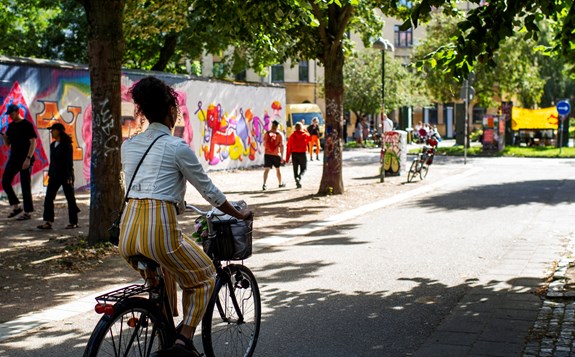We use cookies on this website. Cookies help us deliver the best experience on our website. Read about cookies.
-
- Education
- Education
- Programmes and courses
- Applications and admissions
- Tuition fees
- Scholarships
- Exchange studies at Malmö University
- Study Guidance
-
- After admission
- After admission
- Moving to Malmö
- Pre-orientation
- Arrival guide
-
- About studies at Malmö University
- About studies at Malmö University
- Why choose Malmö University
- Understanding university studies
- Connect with our students
On the page -
- Research
- Research
-
- Doctoral studies
- Doctoral studies
- Doctoral courses
-
- Doctoral schools
- Doctoral schools
- Adaptation of urban space through sustainable regeneration
- ComBine
- Culturally Empowering Education through Language and Literature
- Education, Learning and Globalisation
- Finding ways in a time of great future challenges (FinnFram)
- Swedish National Graduate School in Science and Technology Education Research
- Learning in Multicultural Societal Contexts
- Pedagogy and Vocational Skills
- Relevancing Mathematics and Science Education (RelMaS)
- Sustainable Movement Education
- The National Research School for Professionals in Social Services
- Research subjects
-
- Research centres
- Research centres
- Biofilms Research Centre for Biointerfaces
- Citizen Health
- Imagining and Co-Creating Futures
- Institute for Urban Research
- Malmö Institute for Migration Studies
- Literacy and Inclusive Teaching
- Centre for Work Life Studies
- Sustainable Digitalisation Research Centre
- Centre for Sexology and Sexuality Studies
-
- Research publications
- Research publications
- Search for research publications in Diva
- Malmö University Press
- Research events
- Participate in a research study
- Coffee Break Quiz
On the page -
- Collaboration and Innovation
- Collaboration and Innovation
- Innovation
- Collaboration with students
-
- Collaborate with researchers
- Collaborate with researchers
- Labs and facilities
- Culture collaboration
- Support Malmö University
- Alumni & Friends
On the page -
- About us
- About us
-
- Faculties and departments
- Faculties and departments
-
- Faculty of Culture and Society
- Faculty of Culture and Society
- Department of Global Political Studies
- School of Arts and Communication
- Department of Urban Studies
-
- Faculty of Education and Society
- Faculty of Education and Society
- Department of Childhood, Education and Society
- Department of Sports Sciences
- Department of Culture, Languages and Media
- Department of Natural Science, Mathematics and Society
- Department of Society, Culture and Identity
- Department of School Development and Leadership
- The Centre for Teaching and Learning (CAKL)
-
- Faculty of Technology and Society
- Faculty of Technology and Society
- Department of Computer Science and Media Technology
- Department of Materials Science and Applied Mathematics
- Faculty of Odontology
- University Dental Clinic
-
- Find and contact Malmö University
- Find and contact Malmö University
- Visit Malmö University
-
- News and press
- News and press
- Graphic manual
- Map of the buildings (Google Maps)
- Merchandise
- Supplier information and invoice management
- Whistleblowing
- Management and decision-making paths
-
- Malmö University's strategy 2030
- Malmö University's strategy 2030
- Sustainability
- Widened recruitment and participation
- Quality assurance work at the University
-
- Malmö Academic Choir and Orchestra
- Malmö Academic Choir and Orchestra
- Student work – video pieces
-
- Annual Academic Celebration
- Annual Academic Celebration
- Academic traditions
- Meet our new professors
- Meet our new doctors
- Honorary doctors
-
- The University in a troubled world
- The University in a troubled world
- Campus total defence
On the page
Malmö University's strategy 2030
with knowledge and society in focus
On this page you can read about the University's overall strategy for 2026-2030.
Malmö University 2030 – Strategy for an open university with knowledge and society in focus sets out a common direction for the entire University and describes three focus areas, with priorities for the coming five-year period.
Our university
The section on Our University describes our profile and our values.
Malmö University is an open and innovative university. We are part of a global community of universities, and academic values form the very foundation of our institution. We safeguard academic freedom and the autonomy, integrity and quality of education and research, and we strengthen the role of universities in society and the world around us. Through knowledge, critical thinking and open dialogue, universities contribute in important ways to democracy, societal development and human rights during these challenging times.
Malmö University is positioned in the heart of our city and in the middle of a dynamic knowledge region, which contributes to our visibility and attractiveness, and creates a vibrant, international environment.
We conduct diverse, high-quality and socially relevant education and research. Our strengths lie in our curious, multi and interdisciplinary approaches, which are reflected in the breadth of our research and ability to respect and draw on different academic fields. We offer academic professional training programmes of importance to society and high-profile research-based general programmes and courses.
Malmö University is a socially and globally engaged university: we address societal challenges through education and research and create solutions through innovation and close collaboration with partners outside academia. We contribute to sustainable development through education, research and collaboration, and by drawing on the commitment and knowledge of our staff and students. All levels of our operations integrate efforts to minimise our impact on the environment and climate.
Diversity among our staff and students is a strength; we work actively to combat discrimination and promote equal rights and opportunities. At our inclusive University all staff and students contribute, and knowledge and experience are engaged through collaboration, collegiality and established processes to integrate student influence.
Focus areas 2026–2030
This section presents the three most important focus areas in the further development of Malmö University during the period 2026–2030. Each of the three focus areas begins with an introduction that outlines the future direction and then outlines a number of selected priorities.
Our community and place
Our University will be inclusive and open to the world around us, at a local, regional, national and international level. The University will offer places to work, learn and meet in which staff and students can develop and contribute with their knowledge and commitment. Our community and place in the world will continue to develop through academic values, collegiality, cooperation, innovation, and culture.
Priorities 2026-2030
- To safeguard academic freedom at our University, in Sweden and globally and, in collaboration with others, strengthen the role of universities through open, critical and research-based dialogues on the challenges we are facing
- To strengthen an academic identity and sense of community among staff and students and create well-designed, creative and inclusive places to work, learn and meet
- To ensure a good work environment for staff and students through systematic management of the factors that promote good health
- To develop strategic recruitment and create clear and gender equal career paths by focusing on the provision of skills, career development positions, as well as positions for senior lecturers and professors, and professional development
Our education
At our University, education and research will be inseparable and mutually enriching. We will offer diverse and societally relevant programmes and courses of the highest quality and strive for excellence. We will equip our students for the labour market of the future and lifelong learning with in-depth subject knowledge, the ability to think critically and the wider skills that enable them to engage as active citizens (bildning). Education will continue to develop through its basis in research, teaching and learning in higher education, internationalisation, collaboration and innovation.
Priorities 2026-2030
- To strengthen the research basis of education and its development by close interaction between education, research and wider society, increasing the proportion of students pursuing second-cycle programmes and supporting student participation in research projects
- To integrate internationalisation into education through active participation in strategic international collaborations, increased student and teacher mobility, additional courses taught in English, and English-language elements in all programmes.
- To strengthen integrated student influence and active student engagement by developing the joint quality assurance processes, actively supporting the work of the student unions, and creating places to meet and interact
- To support widened recruitment and widened participation by anchoring our education to students’ future careers, and providing pedagogy and support to strengthen their academic literacy and subject knowledge
- To further work on digitalisation and AI in education through critical, responsible and innovative approaches and methods
Our research and doctoral education
At our University, education and research will be inseparable and mutually enriching. We will offer diverse research and doctoral education of the highest quality and with significant scientific and societal impact and strive for excellence. Research and doctoral education will continue to develop through multidisciplinary and interdisciplinary research environments, internationalisation, open science, collaboration and innovation.
Priorities 2026-2030
- To increase the extent and impact of research through increased external funding, scientific publication, research infrastructure and communication, collaboration and innovation, in national and international contexts
- To work to ensure that all research and teaching staff are part of creative and inclusive research environments through strengthened research leadership and a focus on academic citizenship
- To integrate internationalisation into research and doctoral education through active participation in strategic international collaborations, increased international recruitment, more international research collaborations and increased mobility of doctoral students and researchers
- To strengthen doctoral education through collaboration between subject areas, faculties, higher education institutions, and partners outside academia, in national and international contexts
- To further work on digitalisation and AI in research and doctoral education through critical, responsible and innovative approaches and methods
Download Malmö University 2023 - Strategy
I avsnittet om Vårt universitet beskrivs vår profil och våra värden.

